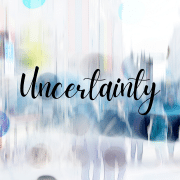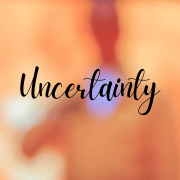With the current Covid-19 Pandemic, life is more uncertain than ever before, especially for employees. So what can you, the employer do, to support employees during this uncertain time? It’s all about embracing uncertainty.
I was listening to the BBC news the other week. I was particularly drawn to a story about a bakery that had managed to reopen, even with the 2 metre distancing rules. They had one major challenge. One area of production required two people to be working in close proximity at all times. Management couldn’t come up with a solution to this problem.
Overcoming Challenges
What did they do? They asked their employees to get creative and think of ways round the problem, so that they could reopen.
The solution: A husband and wife worked for the company in different areas of the business. They lived together so the social distancing did not apply. They were happy manage that particular part of the production on a temporary basis. Problem solved!
Engage with Employees
In these challenging times, many companies are facing a restructure or administration. As a leader, you may feel solutions have to come from the top. Perhaps telling employees just how uncertain the future of the company is, might make them anxious or stressed. You want to protect them. That is understandable.
In reality they are probably already worried about the future. Lack of communication usually leads to speculation and greater levels of anxiety and stress. Recognise that it is a difficult time and encourage employees to think about what “surviving-well” might look like.
Be honest and consistent with them. Tell them exactly what you do and don’t know. Tell them what the organisation is struggling with. Facilitate open forums for employee input. Give them time to mull over the challenges and collectively come up with solutions.
There is no guarantee, but there is a chance that, like the bakery, their collective creativity will find a solution that might just solve the problem.
Focus on areas that they can influence. Remember to share what is positive as well as what is challenging. Make sure to recognise their hard work and resilience during “tough time”. Employees need positive reinforcement more than ever. If they are working remotely, they don’t have the usual physical ques and casual conversations that tell them they are doing well.
Embrace new ways of doing things and be open to all ideas. Be as flexible as possible. Enable employees to juggle work, life and family commitments in a way that works for everyone.
Communication is Key
Communication is always recognised as being critical, but often underestimated and inadequate. It is easy to get bogged down in the challenges and forget to tell employees what is going on.
- Communicate with employees often.
- Use a variety of media.
- Present to the whole company, divisions and teams at different times and in different ways
- Enable forums for Q&A.
- Make sure solutions are captured, input is recognised and ideas are met with an open mind.
- Send updates on items discussed.
- Throw out old expectations and create new ones.
Risk Assessment
Carry out a risk assessment across all levels of the organisation and ensure that employees are engaged as part of the process. Plan for specific scenarios before they happen! Communicate early and often. This is a must do even for sole traders and micro businesses. It allows the possibility of a Plan B, minimises the impact of risk and takes advantage of opportunities.
Lead by Example
How you react will influence how employees perceive the situation. Be the steady helm to lead through the troubled waters.
The language you use is particularly important. Any attachment to certainty will increase stress and anxiety. Use of the words like “hoped for”, “expected outcomes”, “right” and “wrong”, will stifle creativity.
Listen and pay close attention to your employees. Use words like “might”,” possibility”,” I wonder” and “maybe”. You might wonder if a particular scenario is workable, and you might wonder if that is the right solution. It might be right, it might be wrong. That’s the thing about uncertainty – you can’t be sure. Keep an open mind.
Create and share key learning moments. Change your mind if you need to. Employees will understand if you communicate. This is all about your personal mindset. Let go of the need for certainty and embrace the new.
Employees are our greatest asset. They can help us find solutions for readiness, response and recovery. The instincts and actions that will see us through the current global crisis will also make us stronger as we face the longer term challenges.
I have a book coming out in 28th September in collaboration with Charlotte Valeur. It is called Effective Directors QTA. In my section on health and wellbeing I talk more about the importance of supporting employees, giving you key questions to ask to improve your wellbeing strategy. Click here for a copy.












